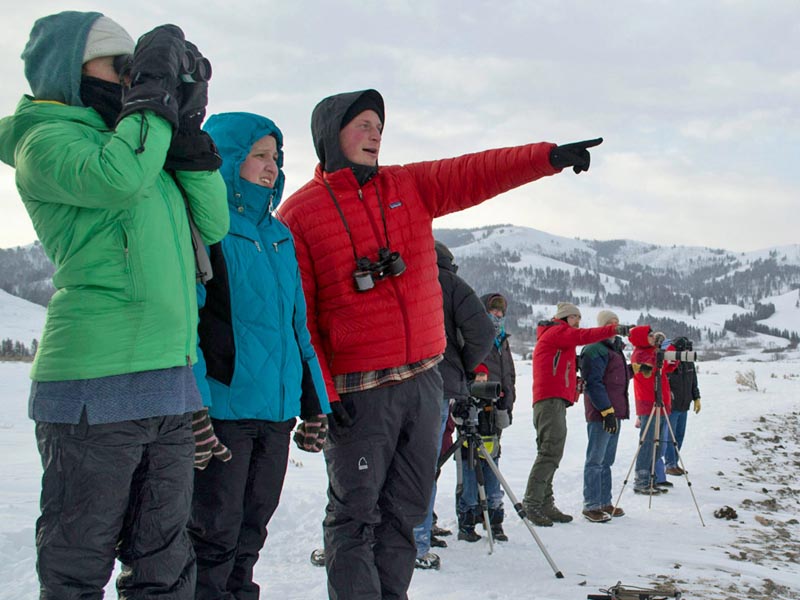- Editorial Offices
- 203 Brantly Hall
- Missoula, MT 59812
- (406) 243-2488
- themontanan@umontana.edu
Student Success: The Heart of Everything
Our mission is to ensure a high-quality education is accessible to all walks of life.
"At this university you can access an education that is on par with that of any institution in this land,” President Bodnar says. “As good as one can get at the Harvards, the Stanfords, the MITs of the world. But what’s different about the University of Montana is that our mission is to ensure that high-quality education is accessible to people from all starting points and different walks of life. We deliver this education not just to the select few, but rather to the many.”
At the center of Campaign Montana is a new effort dubbed the Student Success Initiative. Ensuring students achieve success in college seems like an obvious concept but the thinking and strategy behind the initiative is exciting, radical and more complicated than it seems. What does student success actually look like? And how do you deliberately, systematically make it happen?
Bodnar spends a lot of time thinking about how students’ experiences at UM will prepare them for success in life, and contemplating the mechanisms that will ensure students receive the education and engage in experiences that will help them fulfill their potential. UM has many resources to ensure that happens, and it recently added another: New Vice Provost for Student Success Sarah Swager was hired to oversee the campus programs and resources that help students flourish.
Despite having so many pieces in place for a successful education, most universities still struggle to connect students with key resources and support. Those gaps in the system reduce the percentage of students who complete a degree and can diminish the career trajectory of graduates.
Bodnar and Jon Harbor, executive vice president for academic affairs and provost, and their teams have defined a pathway for students that systematically ensures touchpoints with critical academic advising, faculty mentoring, experiential learning and career resources along their journey. It’s a holistic approach that at its core identifies the factors in a student’s life that impact success.
“Our top priority at this University is to place student success at the center of everything we do, so every decision we make, every discussion we have, we analyze it through that lens,” Bodnar says.
One of the changes the University is implementing involves academic advising. In many university settings, students are advised solely by faculty who are already meeting demands associated with teaching and research. UM has hired professional advisers and will seek private support to hire several more, who will help students map their education. These professional staff augment the important mentoring undertaken by faculty to engage students in research, connect them with professional networks and advise on career opportunities.
“The research shows nationally that students are far more successful if they have a professional academic adviser – someone who has been trained in that field, where that’s their only focus,” Harbor says. “Those academic advisers use a lot of data and analytics to really provide the support students need to get them thinking about their entire career plan and how not just their courses, but their clubs and their summer experiences and internships, fit into that entire plan for their life.”
UM also will implement other services and technology to track a student’s progress toward goals in all areas of their studies. If students begin to struggle in a class, the adviser can identify the trouble early and connect the students with resources to support successful learning outcomes and completion of the course. Advisers also are trained to identify students’ strengths and direct them to scholarships, internships and extracurricular activities that are stepping stones to their educational and career goals.
Programming such as internships and study abroad can be available to students with financial need through private support and have a significant impact on a student’s success in college. Creating more of those opportunities for students across campus is part of the initiative. The goal is to create a stronger, more-fulfilling student experience that generates the entrepreneurs, artists and leaders of tomorrow.
With private investment, UM will offer more distance-learning opportunities, so students who need to learn remotely because of family or work obligations can pursue and complete degree programs too. Expanded summer programs will help those with complicated schedules, such as student athletes, student teachers and others. These students often find themselves challenged to complete required coursework.
Emergency funds fill out the picture. Some students might struggle to pay a medical bill and tuition, which can derail them for a whole semester, making it more likely that they won’t return to complete their degree. A financial safety net can help a student stay in school and fulfill their potential.
Bodnar explains that students who start off on the right foot from the beginning realize the best outcomes. For instance, students who enroll in the Freshman Wilderness Experience, a four-day immersive experience with other new students held before formal classes begin, build a network that gives them an instant community, and those students are 10 percent less likely to drop out.
“Really, we are thinking about the wellness of students, not just at the health center, but in the classrooms and the residence halls,” Harbor says. “This weaving together of what used to be separate areas of the University makes sense to students. When you are a student, you live a 24/7 day. The number of hours in a classroom or doing homework is actually a small number of your total 24. So how do we think, as a University, of that total experience? Because it’s that total experience that prepares you for that total life.”
The UM College of Business is perfectly poised to be a campus model for student success, partly because the students there train for their chosen career from their first class. Students learn about marketing theory or accounting in the classroom but also spend time at companies in the community and meet with successful alumni, some of whom have risen to the top of Fortune 500 companies.
Business students also learn critical skills, like how to network in a professional setting, engage during a business lunch, develop a compelling resume and pitch themselves in an interview.
The business college’s Gianchetta Student Success Center, named after Larry Gianchetta, longtime business school dean, and his wife, Dee Dee, offers a one-stop shop for all advising, career services, graduate programs, internships and scholarships. In the first six weeks of operation, 1,670 students visited for undergraduate services and about 240 for graduate services.
The college has offered academic advising, a career development program and internship support for a long time, but scattered in separate places. The student success center brings together all these pieces of the puzzle. Academic advising helps students figure out how to fit an internship into coursework, deliberately craft a career path and more.
In addition to trained staff, the student success center gives students access to a variety of technologies donated by alumni and businesses, like the conference room where they have a professional setting to participate in Skype job interviews.
“There is very positive momentum around the new student success initiative,” center Director Kathleen Tarkelson
says. “Imagine how future support will impact all students and the professionals helping them.”




